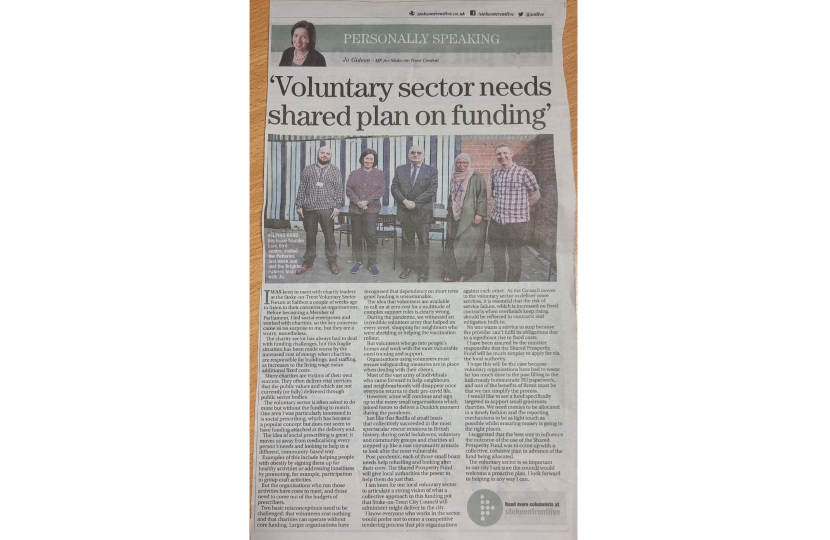
I was keen to meet with charity leaders at the Stoke-on-Trent Voluntary Sector Forum at Saltbox a couple of weeks ago to listen to their concerns as organisation. Before becoming a Member of Parliament, I led social enterprises and worked with charities, so the key concerns came as no surprise to me, but they are a worry, nonetheless.
The charity sector has always had to deal with funding challenges, but this fragile situation has been made worse by the increased cost of energy when charities are responsible for building, and staffing, as increases to the living wage mean additional fixed costs.
Many charities are victims of their own success. They often deliver vital services that the public values and which are not currently (or fully) delivered through public sector bodies. The voluntary sector is often asked to do more but without the funding to match. One area I was particularly interested in is social prescribing which has become a popular concept but does not seem to have funding attached at the delivery end. The idea of social prescribing is great; it moves us away from medicalising every person’s needs and looking to help in a different, community-based way.
Examples of this include helping people with obesity by signing them up for healthy activities or addressing loneliness by promoting, for example, participation in group craft activities. But the organisations who run those activities have costs to meet, and those need to come out of the budgets of prescribers. Two basic misconceptions need to be challenged; that volunteers cost nothing and that charities can operate without core funding. Larger organisations have recognised that dependency on short term grant funding is unsustainable.
The idea that volunteers are available to call on at zero cost for a multitude of complex support roles is clearly wrong. During the pandemic, we witnessed an incredible volunteer army that helped on every street, shopping for neighbours who were shielding or helping the vaccination rollout. But volunteers who go into people’s homes and work with the most vulnerable need training and support.
Organisations using volunteers must ensure safeguarding measures are in place when dealing with their clients. Most of the vast army of individuals who came forward to help neighbours and neighbourhoods will disappear once everyone returns to their pre-covid life. However, some will continue and sign up to the many small organisations with joined forces to deliver a Dunkirk moment during the pandemic.
Just like that flotilla of small boats that collectively succeeded in the most spectacular rescue missions in British history, during covid lockdowns, voluntary and community groups and charities all stepped up like a vast community armada to look after the most vulnerable. Post pandemic, each of those small boats needs help refuelling and looking after their crew. The Shared Prosperity Fund will give local authorities the power to help them do just that.
I am keen for our local voluntary sector to articulate a strong vision of what a collective approach to this funding pot that Stoke-on-Trent City Council will administer might deliver in the city. I know everyone who works in the sector would prefer not to enter a competitive tendering process that pits organisations against each other. As the council moves to the voluntary sector to deliver more services, it is essential that the risk of service failure, which is increased on fixed contracts when overheads keep rising, should be reflected in contracts and mitigation built-in.
No one wants a service to stop because the provider can’t fulfil its obligations due to a significant rise in fixed costs. I have been assured by the minister responsible that the Shared Prosperity Fund will be much simpler to apply for via the local authority. I hope this will be the case because voluntary organisations have had to waste far too much time in the past filling in the ludicrously bureaucratic EU paperwork, and one of the benefits of Brexit must be that we can simplify the process.
I would like to see a fund specifically targeted to support small grassroots charities. We need monies to be allocated in a timely fashion and the reporting mechanisms to be as light touch as possible whilst ensuring money is going to the right places.
I suggested that the best way to influence the outcome of the use of the Shared Prosperity Fund was to come up with a collective, cohesive plan in advance of the fund being allocated. The voluntary sector is so important to our city I am sure the council would welcome a proactive plan. I look forward to helping in any way I can.
